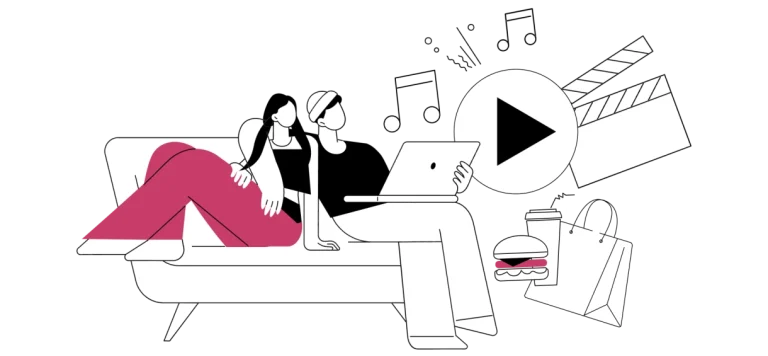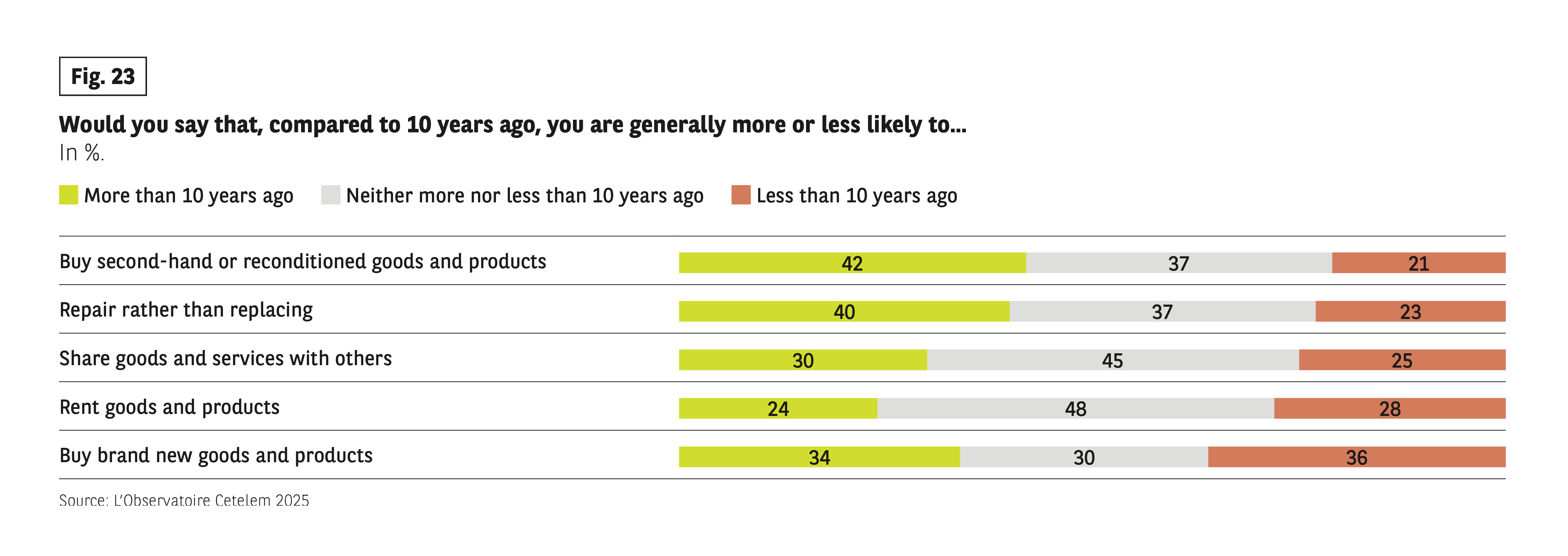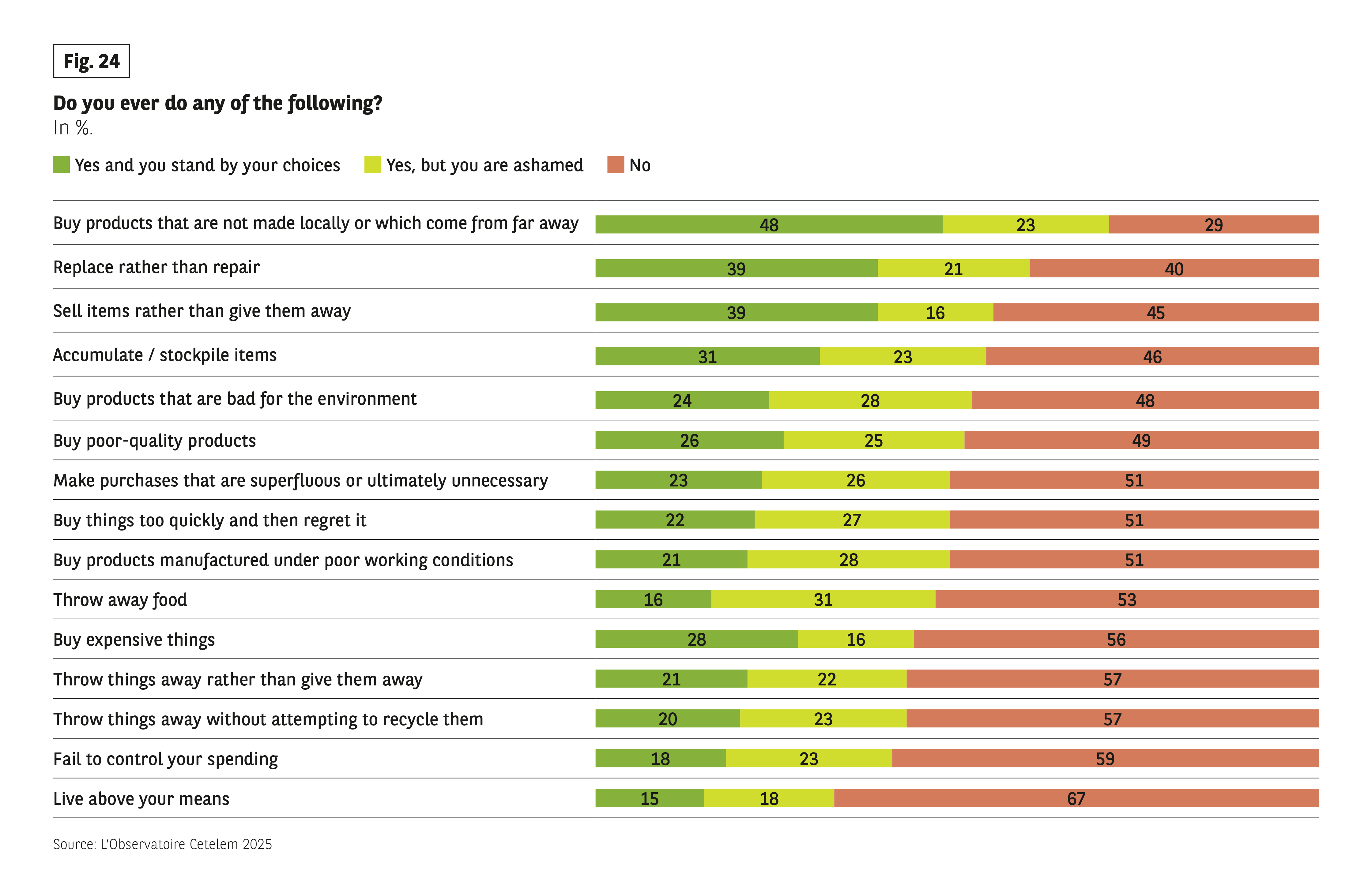Greater mindfulness about how one consumes: there is more room for improvement


BUYING SECOND-HAND: AN IDEA THAT IS GRADUALLY GAINING GROUND
The road already seems paved not only with good intentions, but for a different kind of consumption to make its mark on the landscape, thanks to tangible changes to purchasing habits.
The fact that 4 out of 10 Europeans feel they have been buying more reconditioned or second-hand goods in the last decade provides confirmation of this market’s growth.The Swedes, French, Spanish and, even more so, the Poles are the most accomplished in this area, with the Germans and British at the other end of the scale (Fig. 23).
On average, just as many people opt to repair rather than replace products, with the Italians, Spanish, Romanians and Portuguese being the most likely to favour this option, while the Germans again show the least enthusiasm.
Quite far behind, the idea of sharing or renting products struggles to win people over, with Europeans feeling that their behaviour has not changed in this respect over the last decade.
It should be noted that there are significant generational differences across all the items listed, particularly when it comes to reconditioning, renting and sharing goods. Young people have evolved much more quickly than their elders, a further sign that this generation is taking environmental issues into greater consideration.
Fig 23 – Use of various modes of consumption
Download this infographic for your presentations Context
The figure questions the frequency of different behaviors compared to ten years earlier.
Visuals
Horizontal bars divided into three categories: more, stable, less than ten years ago.
Data
• Used purchase: 42% more, 37% stable, 21% less.
• Repair rather than re-purchase: 40% more, 37% stable, 23% less.
• Sharing of goods and services: 30% more, 45% stable, 25% less.
• Property rental: 24% more, 48% stable, 28% less.
• New purchase: 34% more, 30% stabl, 36% less.
Synthetic reading
Second-hand, repair and sharing practices are growing, while the purchase of new cars is declining.
Context
The figure questions the frequency of different behaviors compared to ten years earlier.
Visuals
Horizontal bars divided into three categories: more, stable, less than ten years ago.
Data
• Used purchase: 42% more, 37% stable, 21% less.
• Repair rather than re-purchase: 40% more, 37% stable, 23% less.
• Sharing of goods and services: 30% more, 45% stable, 25% less.
• Property rental: 24% more, 48% stable, 28% less.
• New purchase: 34% more, 30% stabl, 36% less.
Synthetic reading
Second-hand, repair and sharing practices are growing, while the purchase of new cars is declining.
EUROPEANS PLEAD THEIR INNOCENCE
As we have already seen, Europeans have a complex and sometimes contradictory relationship with consumption. Indeed, their desire to consume differently does not prevent them from making certain more unsustainable consumer choices, which they stand by and feel no real shame about.
Firstly, half of our respondents say they are not ashamed of buying products that are made far from where they live. Replacing products rather than repairing them and reselling items rather than giving them away elicits no guilt in 4 out of 10 consumers (Fig. 24).
A feeling of shame does prevail when it comes to buying products that are damaging to the environment, superfluous, devoid of purpose and which are produced under poor working condition. And above all, Europeans feel particularly ashamed when they throw away food.
It should be noted, however, that a majority of people state that they have never found themselves in any of the situations put to them. Young people are the most likely to make this claim, but they are also the most liable to feel ashamed.
Fig 24 – Consumption situations encountered
Download this infographic for your presentations Context
The figure lists potentially problematic consumption behaviours.
Visuals
Horizontal bars divided into three categories: “Yes and you assume it”, “Yes but you are ashamed”, “No”.
Main data
Examples:
• Non-local products: 48% yes assumed, 23% yes with shame, 29% no.
• Replace rather than repair: 39%, 21%, 40%.
• Resell rather than donate: 39%, 16%, 45%.
• Store or accumulate: 31%, 23%, 46%.
• Buying bad for the environment: 24%, 28%, 48%.
• Buying too quickly and regretting: 22%, 27%, 51%.
Synthetic reading
A majority recognise certain behaviours, but the share of “no” responses often exceeds 45%.
Context
The figure lists potentially problematic consumption behaviours.
Visuals
Horizontal bars divided into three categories: “Yes and you assume it”, “Yes but you are ashamed”, “No”.
Main data
Examples:
• Non-local products: 48% yes assumed, 23% yes with shame, 29% no.
• Replace rather than repair: 39%, 21%, 40%.
• Resell rather than donate: 39%, 16%, 45%.
• Store or accumulate: 31%, 23%, 46%.
• Buying bad for the environment: 24%, 28%, 48%.
• Buying too quickly and regretting: 22%, 27%, 51%.
Synthetic reading
A majority recognise certain behaviours, but the share of “no” responses often exceeds 45%.
Fig 25 – Brand importance
Download this infographic for your presentations Context
The figure analyzes the importance given to brands in purchasing choices.
Visuals
Pie chart with five categories.
Data
• Very high: 7%
• Somewhat important: 27%
• Somewhat low-materiality: 38%
• Very low materiality: 15%
• Not significant: 13%
Synthetic reading
Two-thirds of respondents give little or no importance to brands.
Context
The figure analyzes the importance given to brands in purchasing choices.
Visuals
Pie chart with five categories.
Data
• Very high: 7%
• Somewhat important: 27%
• Somewhat low-materiality: 38%
• Very low materiality: 15%
• Not significant: 13%
Synthetic reading
Two-thirds of respondents give little or no importance to brands.
